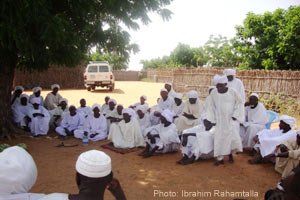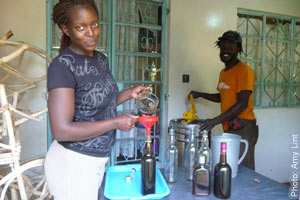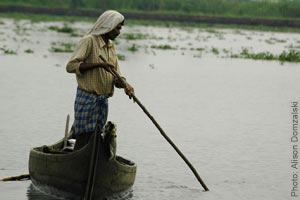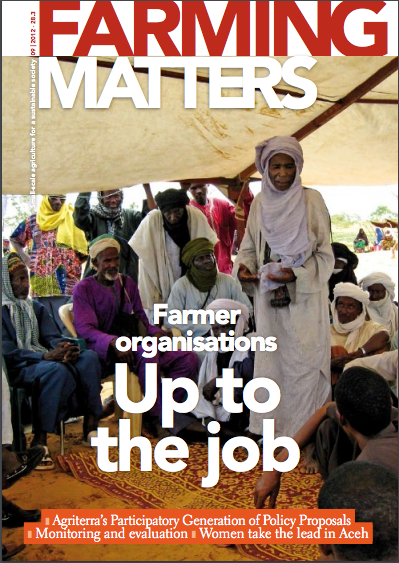Examples from all over the world show that collective action is the most efficient and sustainable way for farmers to achieve higher incomes. Beyond the economic benefits, however, farmer organisations support their members and local communities in many other ways.
Sudan: Associations make the difference
Sudan is the world’s largest producer of gum arabic. Consisting of the dried exudates of Acacia trees, this is an ingredient in many food and pharmaceutical products. Duri

ng recent decades, drought, desertification, civil strife and low prices have led small-scale farmers to fell many Acacia trees, often in order to expand their production of cash and food crops. This has led to worrying levels of deforestation in areas that are already hard-hit by droughts and desertification.
To turn the tide, more than 100 producer associations, with a total membership of more than 10,000 households (of which 25% are women), decided to join a government effort to generate better revenues from gum cultivation in the country’s “gum belt”: Western and Central Sudan. The farmers received technical, managerial and financial training. They worked together to distribute seedlings and jointly purchase water reservoirs, gum stores, tractors and wells.
After four years, their income levels have increased by 65%, and their living conditions improved notably. Reduced income inequality between urban and rural areas is providing a “peace dividend” to the war-affected population of Sudan. The revitalization of the gum arabic sector is also contributing to the much needed reforestation of the country.
More information?
Contact Ibrahim Rahamtalla, at the Sudan Gum Arabic Production & Marketing Project in Khartoum.
E-mail: abualaa_hamad@hotmail.com
Kenya: Facilitating cooperation
Like many rural areas, the Bondo district, in western Kenya, is witnessing a strong urbanisation process. This means a higher demand for farm products, and farmers cannot always respond. Grow Strong, a small NGO working towards food security, initiated the Bondo Food Hub in the !rst part of 2012.
The Hub aims to enhance co-operation by pooling resources and information. Farmers with similar interests form interest groups within the Hub, focusing on, for example,

beekeeping or sesame production. The Hub helps these farmer groups by housing processing equipment, developing market opportunities and assisting with packaging and quality control standards.
The Hub will soon have a space for dryland farming demonstrations and kitchen gardens for the urban population and plans to collect and distribute important traditional seed varieties through community seed banks. Drawing on local traditions of self-help, the Bondo Food Hub is helping farmers work together and co-operate at a time when farming has become riskier than ever. Their objective is to show how, together, farmers can be more productive, earn a decent income, and contribute to the district’s food security and sovereignty.
More information?
Contact Amy Lint at Grow Strong.
E-mail: amy@growstrong.org
India: Community fish culture
In India, freshwater aquaculture in man-made water bodies, such as tanks and ponds, is on the rise. In Malliyabad village, in the state of Karnataka, 33 landless families depend on fishing in a minor irrigation tank in the village.
However, they were being squeezed by middlemen who control fishing rights, !sh harvesting and marketing. These families have responded to these problems by developing and strengthening a community based approach to fish culture and have signed up to the state government’s Jala Samvardhane Yojana Sangha project.

Under this project, fishermen and women form Tank Users Groups (TUG) to obtain long-term fishery leasing rights, as well as to ensure the operation and maintenance of the tanks. Income from fisheries and other revenues (such as water tax or the royalties on fisheries) are deposited in the Tank Development Fund: 50% of the revenue generated goes to the fishermen and women, and 50% to the TUG which operates and maintains the tank.
The organisation also gives fisherfolk access to trainings and to inputs such as fish fingerlings and harvesting nets. Members have also received technical, marketing and legal support. The participation of women as group members is helping develop a more diverse and sustainable production system.
More information?
Contact Rajkumar Pujari of the Jala Samvardhane Yojana Sangha project, Government of Karnataka.
E-mail: dr_rajkumar_p@yahoo.com
The Netherlands: Governing environmental services

In the Dutch province of Friesland, the North Frisian Woodlands (NFW) farmers’ co-operative is unique in its efforts to protect the local landscape. This umbrella organisation provides information and training on natural landscape and biodiversity management to 90% of all the dairy and livestock farmers in the region. It also offers administrative help to its 1,050 members – especially in relation to the government subsidies offered in order to support the ecosystem services that farmers provide: the maintenance of forage space for geese, for example, and of hedgerows between grazing lands that maintain biodiversity in farmlands.
During the past 20 years, NFW has challenged Dutch and European policies and regulations related to landscape management. Under the framework of the Common Agricultural Policy (CAP) of the European Union, NFW convinced the Dutch government of the value of a collective, regionally tailored approach to payments for ecosystem services.
NFW is currently one of the pilot projects under the CAP. Its continuous dialogues with the municipal, provincial and state governments have been a catalyst for change. The proposals for the 2014-2020 CAP follow this example, suggesting that groups of farmers should be eligible to receive payments for the public services provided by their approach to agriculture.
More information?
Contact Ingrid van Huizen at the North Frisian Woodlands co-operative.
E-mail: ivhuizen@noardlikefryskewalden.nl

